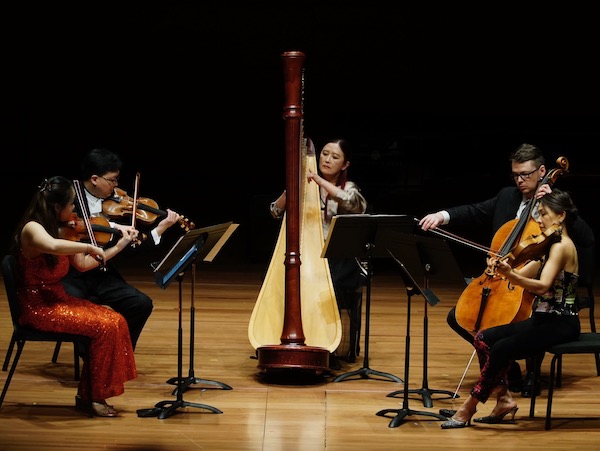Taiwan Philharmonic joins forces with Chamber Music Society to open U.S. tour

The dual nature of the island of Taiwan—recognized diplomatically as part of greater China, yet functioning as an independent democracy—is reflected in the name of its major orchestra, which is called the National Symphony Orchestra there and the Taiwan Philharmonic when it’s on the road.
Taiwan has been in the geopolitical headlines lately, and perhaps not coincidentally, is looking to make some cultural news as well. One sign of that is the orchestra’s current visit to the United States, which includes concerts in David Geffen Hall, Washington, D.C. and the Chicago suburb of Naperville. The tour concert opened with a “trailer” of sorts: Taiwan Philharmonic principals and musicians from the Chamber Music Society of Lincoln Center joining forces for a lively evening of chamber music Friday night at Alice Tully Hall.
On paper, the concert’s roster was split nearly 50-50 between members of the Philharmonic and CMS, but such distinctions blurred when one noted that three of the latter—including pianist and CMS co-director Wu Han—were born and/or raised in Taiwan, and several of the Philharmonic players had studied at prestigious music schools in the U.S. The mood in the hall was more like a family reunion than a diplomatic mission.
Although the tour’s orchestral concerts will feature composers with Taiwanese roots, Friday’s program stuck to core chamber repertoire: Beethoven, Mozart, Shostakovich, and a semi-novelty, André Caplet’s Conte fantastique for Harp, Two Violins, Viola, and Cello.
If one wants to begin at the beginning, it’s hard to beat Beethoven’s Op. 1, no. 1. Despite the numbers, however, this Piano Trio in E-flat major is anything but juvenilia. Beethoven had already composed dozens of pieces and was in his mid-20s when he saw this trio and its two opus-mates into print as his official composing debut—over the objections of his teacher Haydn, who thought them too avant-garde for the public to understand.
Of course, it’s exactly those fresh ideas (within a familiar Classical framework) that delighted listeners Friday night, as pianist Wu Han brightly introduced the first movement’s main theme, decorating it with blazing scales. Violinist Chih-Hong Tseng and cellist (and CMS co-director) David Finckel had their turn with the gentle second theme, but neither challenged the dominance of the piano, a feature of the genre ever since Haydn perfected it in the 1780s. Wu Han took charge of the movement with fine articulation and elegant phrasing.
The first movement’s slam-bang finish brought applause from the audience, which subsequently clapped at every movement break all evening. This “lapse” of concert etiquette, which the players waited out in good humor, seemed to indicate the presence of as many supporters of Taiwan as fans of classical music in the audience. (One can, of course, be both.)
The tender theme of the Andante cantabile got more equal treatment, the two strings soaring with it before the piano gently echoed the motif with aria-like embellishments. The Scherzo, a scampering dance with lightning give-and-take among the parts, found a more subdued tone color in the relaxed, legato trio. The precise ensemble playing was exhilarating in the comic finale, as the three performers negotiated leaps of a tenth, gusts of scales, rapid-fire counterpoint, and a classic Beethoven hesitation coda.
Caplet’s Conte fantastique is a spooky “fantastic tale,” inspired by Edgar Allan Poe’s The Masque of the Red Death, which struck a contrast with Beethoven’s peppy trio. The composer was a contemporary of Debussy and like him leaned on atmospherics and whole-tone harmonies.
Philharmonic harpist Shannon Shuen Chieh led this eerily contemporary tableau of aristocrats hiding from a spreading plague by plucking enigmatic chords on her instrument, knocking scarily on its sound box, and wrapping her fellow players—violinists Stella Chen and Hao-Tun Teng, violist Hsin-Yun Huang, and cellist Mihai Marica—in cobwebs of soft arpeggios. The ensemble vividly captured the La Valse-like note of desperation in the virus-avoiders’ revelry.
Mozart’s Clarinet Quintet in A major, K. 581, spotlighted the Philharmonic’s principal clarinetist, Julien Chun-Yen Lai—perhaps a little too much in the first movement, as violinists Danbi Um and Richard Lin, violist Grace Huang and cellist Finckel deferred to Lai’s big, round, sometimes hooty tone and his tendency to rush the tempo. But one had to admire his taut phrasing and covered tone in soft passages.
Lai duetted effectively with Um’s violin in the Larghetto, tenderly tapering his phrases at both ends, and showed exceptional breath control in the theme’s pianissimo return. The clarinet was just one strand in the undulating tapestry of the Menuetto, and sat out the Hungarian-accented Trio I for strings before leading Trio II with a country-style ländler tune. Violinist Um and violist Huang took their turns expressively in the variations finale, while Lai gracefully embellished his part on the repeats and preceded the fast coda with a memorably fading diminuendo.
The strings—the aforementioned players minus Um and Finckel, and with cellist Ying-Chi Tang—had the stage to themselves at last in Shostakovich’s Prelude and Scherzo for String Octet, Op. 11. The players made the most of their spotlight finale in music that, with its harsh attacks, queasy melodies and shrieking glissandi, reminds more than one listener of Bernard Herrmann’s score to Psycho. Perhaps that’s one reason Friday’s audience so eagerly applauded music that, just a hundred years ago, baffled the young composer’s teachers even more than Beethoven did Haydn.
The New York Philharmonic presents the Taiwan Philharmonic conducted by Jun Märkl, with violinist Paul Huang, performing works by Felix Mendelssohn, Bruch, Debussy, and Ke-Chia Chen 8 p.m. April 21 at David Geffen Hall. nyphil.org.